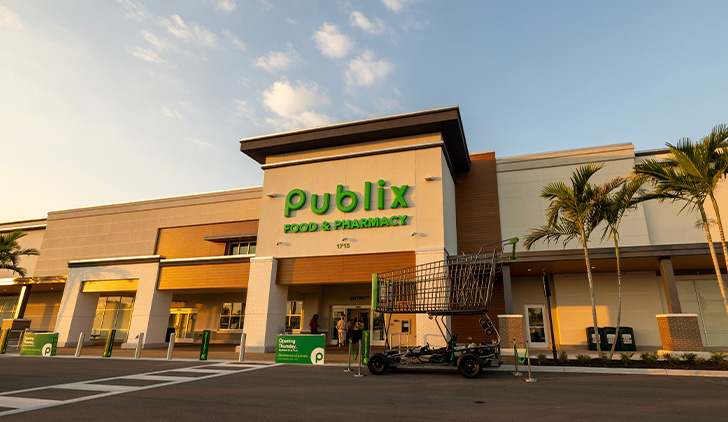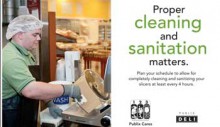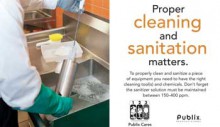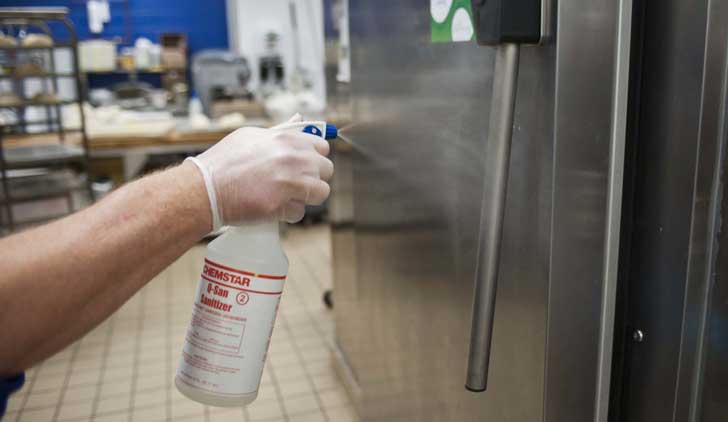
Customers appreciate clean stores, but it’s not only about appearance. Sure, we want to keep our stores looking shiny and new, but we also want to make sure we provide a clean and sanitary environment for preparing and selling food. And since September is National Food Safety Education Month, it’s a great time to learn how our company keeps food safe by making sure stores are clean.
Cleaning service provider
We work with several service providers to help keep our stores clean and make sure equipment is working correctly. Our primary cleaning and sanitation service provider is Chemstar. Chemstar’s sanitation specialists provide our associates training on the proper use of equipment in our stores and help with any cleaning opportunities that arise.
Each month, Chemstar visits every store to provide routine service. If a store has any questions about a cleaning process or needs assistance with cleaning, they can contact Chemstar directly without incurring any additional costs.
Cleaning tools and chemicals
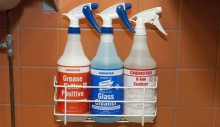 Significant research and rigorous testing is conducted on cleaning tools and chemicals before they are approved for use in our stores. Corporate quality assurance (CQA) works with other departments to evaluate the functionality, quality and effectiveness of cleaning tools and chemicals, and to determine the appropriate personal protective equipment (PPE) associates should wear while using them. These products must meet Publix’s expectations and standards before they’re made available to our stores.
Significant research and rigorous testing is conducted on cleaning tools and chemicals before they are approved for use in our stores. Corporate quality assurance (CQA) works with other departments to evaluate the functionality, quality and effectiveness of cleaning tools and chemicals, and to determine the appropriate personal protective equipment (PPE) associates should wear while using them. These products must meet Publix’s expectations and standards before they’re made available to our stores.
Each cleaning tool is designed for a specific cleaning task. In the bakery, a separate brush is used for cleaning the radiator, water chiller, cake decorating tips, bread slicer, cases and even one specifically for scrubbing pots. Produce has a brush designed specifically for cleaning the pineapple corer, and deli has a brush used only for the ice chute of the soda machine.
All cleaning products used in our stores have been tested and approved to perform tasks in specific departments. Cleaning products range from degreasers and glass cleaners to fruit and vegetable washes and hand sanitizers. There’s even a product that helps prevent bacteria from growing on deli case handles and touch points.
Using the approved chemicals for their intended purpose and wearing the proper personal protective equipment protects our associates and helps maintain the integrity of equipment and other surfaces.
Cleaning schedules
Cleaning schedules vary by task and department, and are sometimes specific to a store. Stores near the beach have to take extra cleaning precautions to avoid salt buildup and rust on metal surfaces like refrigeration equipment on the roof, compactors, generators and even shopping carts.
Research has been done not only to determine the requirements for cleaning our stores, but also the frequency needed to keep them clean.
Some equipment, such as the deli peanut butter grinder, is cleaned and sanitized after every use; deli slicers must be cleaned every four hours; and deli service cases are cleaned and sanitized every week. Keeping equipment, coolers, cases and floors properly cleaned and sanitized helps prevent bacteria and pests. Cleaning schedules were determined for each department to make sure the food we sell is kept safe.
Resources for department managers
Department managers are provided with several resources for referencing food safety topics.
- Department R&P guides are available to identify proper food safety practices.
- Job aids for associates can be found on Publix Connection > Store > Food Safety > Audits, Inspections and Certifications. These quick reference documents provide additional information about safe food temperatures, proper personal hygiene and how to prevent cross contamination.
- Lists of approved tools and chemicals for use in each department can be found on Publix Connection > Store > Food Safety > References and Questions > Sanitation.
- Stores can contact CQA at (863) 688-7407, ext. 35236, or their division food safety specialist to assist with cleaning and sanitation as well as other food safety questions.
| Division | Region/District | Food Safety Specialist |
|---|---|---|
| Atlanta | All | Mac Branch |
| Jacksonville | All | Tim Westbrook |
| Lakeland | Central Region Western Region Districts 03, 04, 09 and 14 |
Terri A. Smith |
| Southwest Region Western Region Districts 06, 17, 27, 29 and 34 |
Faith Holcom | |
| Miami | Southern Region Central Region, Districts 02, 07, 11, 12 and 17 |
Fegor Pineda |
| Northern Region Central Region, Districts 01, 05, 14, and 20 |
Christina Johnson |
Keepin’ it fresh
Each month, the importance of food safety is reinforced to stores through stickers placed on paper towel dispensers in fresh departments. Topics range from cleaning and sanitation and cross contamination prevention to handwashing and associate health.
In past years, all stickers displayed the same message and image for each department. But this year, the stickers received a fresh, new look with updated messages and images that reflect department-specific topics, so the associates affected can better understand the message.
This month, stores received these stickers.
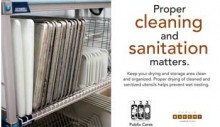 |
|
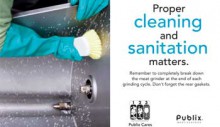 |
|
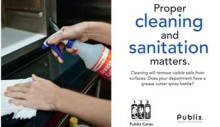 |
|
President Todd Jones accepts Black Pearl Award
 On July 31, President Todd Jones accepted the prestigious Black Pearl Award at the 2013 International Association for Food Protection (IAFP) Annual Meeting. Publix was named the recipient of this award in May of this year.
On July 31, President Todd Jones accepted the prestigious Black Pearl Award at the 2013 International Association for Food Protection (IAFP) Annual Meeting. Publix was named the recipient of this award in May of this year.
The IAFP presents this award to one company each year that shows dedication to ethical business practices, promoting food safety in the community, contributing to public health principles, providing food safety education and promoting food safety programs.
From left: IAFP Past President Isabel Walls, Publix CQA Director Michael Roberson, Publix Quality Control Manager Kathy Kordana, Publix President Todd Jones, Publix Retail Food Safety Specialist Tim Westbrook, Publix Quality Control Brand Manager Connie DuBois, Publix Manager of Special Projects Jennifer Bush, and Publix Food Safety Manager Todd Rossow.

